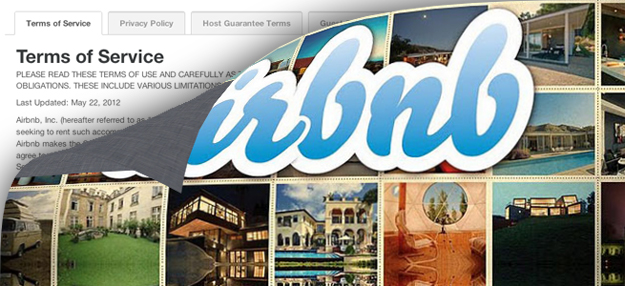
What are you really agreeing to when you click that fateful “agree button? Terms & Conditions cuts out the legal lingo to spell it out in plain English.
If you’re planning to go on vacation anytime soon, you’d be a fool not to check out Airbnb for a place to stay. Known as one of Silicon Valley’s biggest startup success stories, Airbnb has changed the vacation rental game by allowing homeowners (or pseudo-homeowners) to rent their room, their house, their apartment, or even their boat, to guests at a surprisingly low cost. Popular though it is, Airbnb is not without controversy, especially considering the legality of subletting apartments not owned by the site’s hosts, as well as liability issues when a guest ransacks a host’s space. To clear things up once and for all, here are the eight most important provisions of Airbnb’s terms of service.
Terms of Service
Accounts Facebook integration
All Airbnb users – guests and hosts – must be at least 18 years old. Each Airbnb user is only allowed to have one account. If you try to have more than one account, or provide any false information in your account, Airbnb will probably ban you.
This gets slightly more complicated thanks to Airbnb’s Facebook integration, which allows users to sign up using their Facebook login. When you do this, it will immediately pull certain information – name, age, email address – in from Facebook, so make sure all of this stuff is legally accurate before using Facebook to sign up for Airbnb.
Laws and stuff
Airbnb has become increasingly controversial over the past couple years due to the fact that home or apartment renters are probably violating the terms of their lease by effectively “rerenting” out their space on Airbnb – technically known as subletting. If you choose to ignore the terms of your lease, that’s your problem – Airbnb absolves itself of all responsibility. Just don’t be surprised if your landlord serves you with an eviction notice.
Picking guests
Airbnb hosts – the people who rent their space through the site – may accept or deny anyone who requests to stay at their place for any reason. Conversely guests need to ensure they aren’t getting themselves into a dangerous situation by choosing to stay at a particular space.
Host terms
Airbnb enables hosts to make their own rules for guests. For example, some hosts may allow pets, others may not. These rules are totally up to the host, and guests are required to know and abide by hosts’ rules during their stay. Fail to follow these rules, and the host may kick you out early and you’ll likely lose the money you paid for the stay.
Insurance
The issue of liability became a big, tricky point of contention for Airbnb after a host reported having her home ransacked, and much of her belongings stolen, by a guest in the summer of 2011. In response to the resulting uproar, Airbnb announced its “$1,000,000 Host Guarantee,” which promises to give hosts a $1,000,000 insurance policy on “every booking, every time.” Sounds good, right?
Well, not so fast. A quick look at Airbnb’s terms show that all hosts are required to have their own insurance in place to cover any losses or damages. It is only after a host’s own insurance is exhausted that Airbnb’s promised million bucks starts to kick in. So don’t be fooled – you must have valid insurance if you rent your space on Airbnb.
Damage
Now, in the case of small-scale damage, there are ways for hosts to recoup losses from guests directly, with Airbnb’s help. The site says that, when supplied with sufficient evidence from hosts (i.e. pictures), Airbnb reserves the right to charge a guest’s credit card for the amount of the damage. Furthermore, Airbnb will help guests and hosts negotiate the costs of damage, free of charge.
In other words: If a guest breaks a plate, take a picture, tell Airbnb about it, and they’ll help you get reimbursed. If, on the other hand, a guest drunkenly drives through your living room with their Honda Civic, you’re going to have to get your homeowner’s insurance company involved.
Bookings, payments, and fees
As mentioned above, hosts have complete control over who they allow to book their space. Hosts are required to confirm or deny a booking request from a guest within 24 hours. Furthermore, hosts are responsible for setting their per-night rates, cleaning fees, and security deposits (if they choose to require either of the later).
Once a booking is confirmed, the guest pays whatever the total fee is, which may include taxes and cleaning fees. Airbnb then charges hosts 3 percent of the per-night rate for every booking, and collects between 6 and 12 percent of the total fare from the guest. (It is this pricing structure that allows Airbnb to let hosts list their spaces without paying a monthly or annual fee.)
Oh, and if you’re a host, know that Airbnb will require you to file tax documents, so don’t think you can escape paying Uncle Sam his due share of what you make from renting your space on Airbnb.
Cancellations
Hosts have the ability to set their own cancellation policies, so make sure to know what that is if you think you may have to cancel a booking after it’s been confirmed. If, as a guest, you cancel a booking before it’s been confirmed, you’ll be charged nothing – though a hold will be put on your credit card by Airbnb in the mean time.
If a guest does decide to cancel, Airbnb will refund the agreed upon amount to your credit card.


